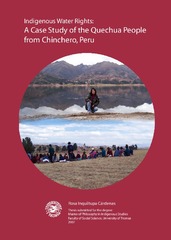Indigenous water rights : a case study of the Quechua people from Chinchero, Peru.
Permanent link
https://hdl.handle.net/10037/1337Date
2007-12-07Type
Master thesisMastergradsoppgave
Author
Cárdenas, Rosa InquiltupaAbstract
In this thesis I discuss and show how the unequal distribution of water rights results in a deprivation of economic, social, and cultural prospects for the indigenous peoples in Chinchero. I attempt to illustrate that Peruvian water legislation does not belong to the same context as the indigenous people’s cultural perception. Firstly, the Peruvian legal context based on the national Constitution and its framework of laws does not work in a traditional culture background due to the ineffectiveness of water ownership in the indigenous territories. Secondly, the Ayllu is considered the indigenous’ unit institution as far as water management is concerned, and, thus, it shapes the cornerstone of a legal system that has been a model in an ancient Inca social structure or “collective community system of ownership”. It also demonstrates that indigenous people have practiced their own rules, characteristics and principles with regard to water. As an extension, a strong argument may be made based on the “Ayni” principle, which connects humans and water. How could the ILO Convention No. 169 warrant the rights to water for indigenous population in Chinchero? The answer to this question lies in articles 14 (land ownership) and 15 (natural resources ownership) of ILO Convention 169. It may also be explained in “Water Law and Indigenous Rights” (WALIR in regard to water self-determination). The above-mentioned international legal framework may be use as a local tool in terms of defending indigenous rights. However, this is the case only when those claiming these rights are aware of them, otherwise they become useless.
Publisher
Universitetet i TromsøUniversity of Tromsø
Metadata
Show full item recordCollections
Copyright 2007 The Author(s)
The following license file are associated with this item:


 English
English norsk
norsk